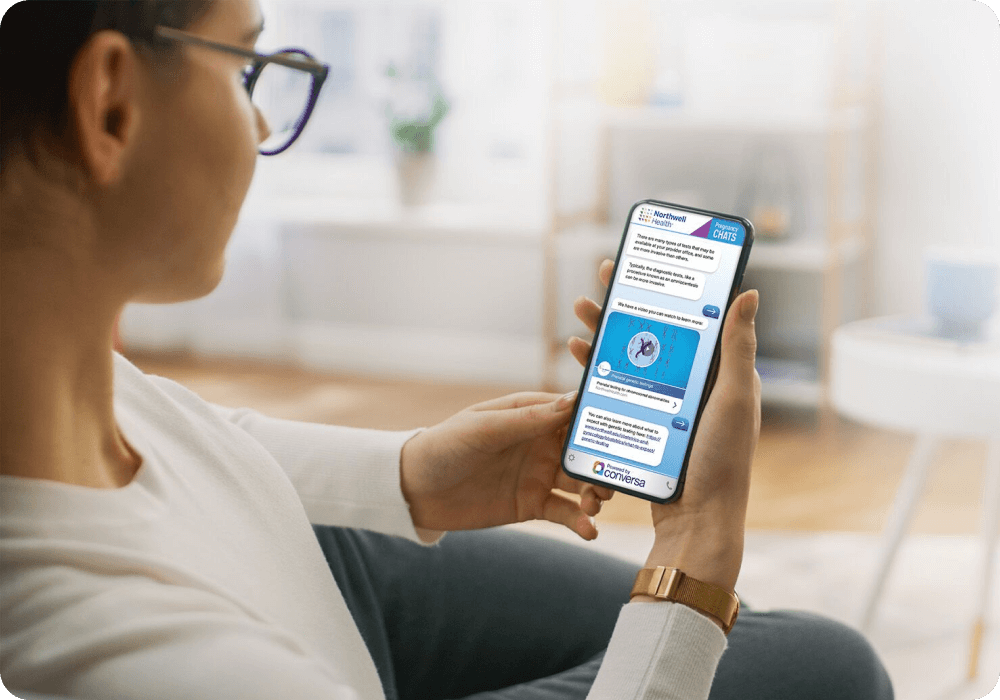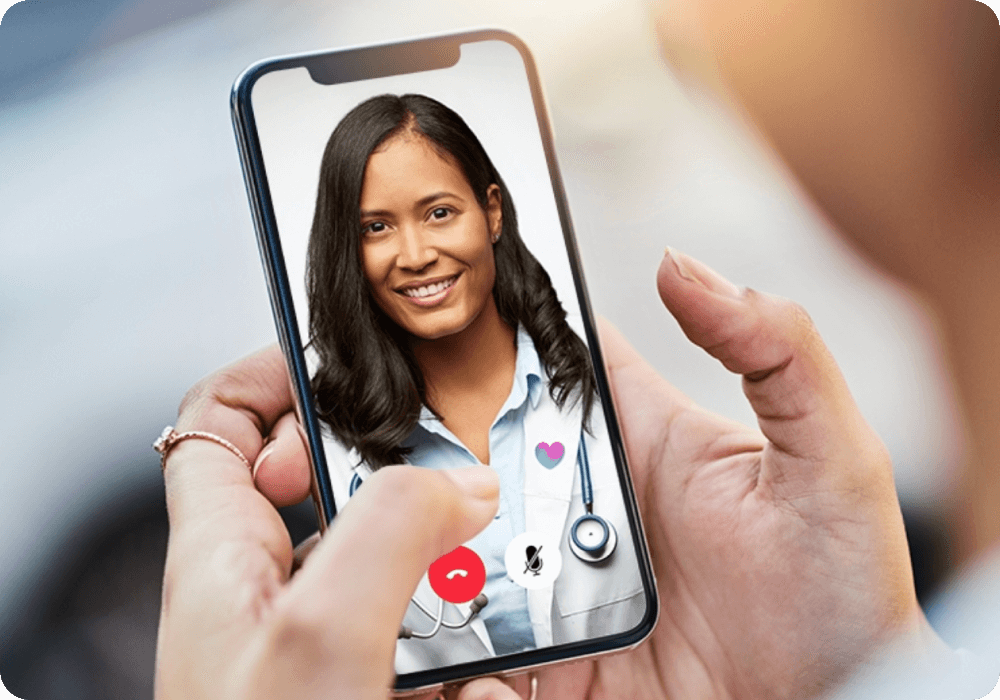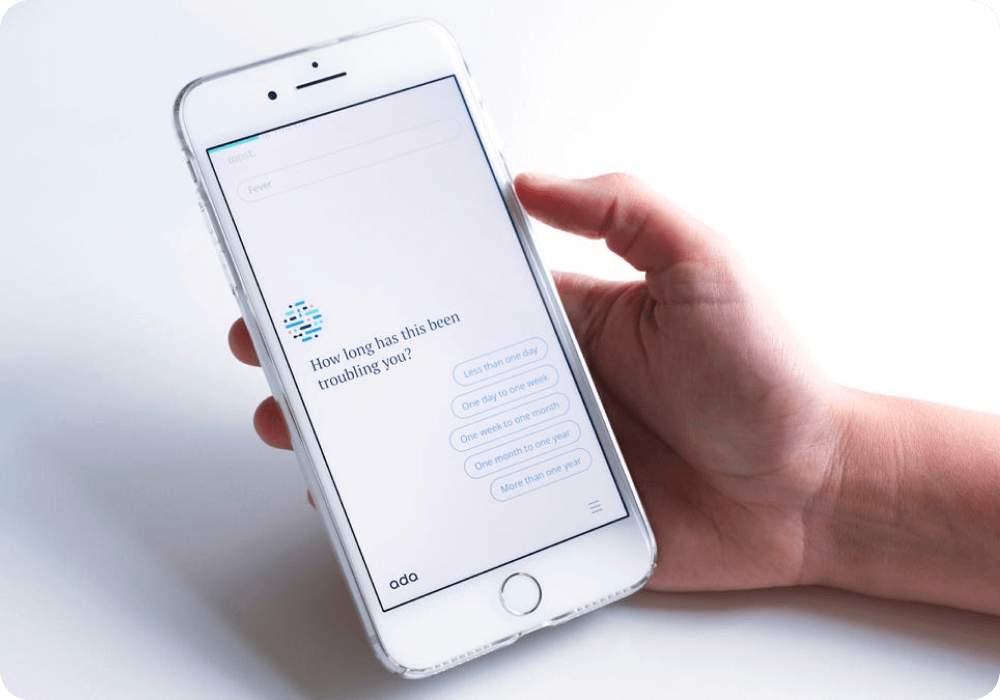For ages, technological advances have been pushing healthcare barriers. So it is no wonder that the form that this continuous evolution of healthcare takes today is marked by one of the fastest-evolving, most influential technological fields of the present: artificial intelligence. There are multiple examples of AI applications in healthcare. In particular, one of them, AI-powered chatbots, is expected to contribute to solving some of the most widespread issues in the industry today.
From overwhelmed workers to growing costs, from jumbled and tiresome administrative processes to long wait times, AI chatbots in healthcare offer healthcare providers tools to improve their operations in key areas.

Benefits of using AI chatbots to improve the healthcare experience
- Performing administrative or repetitive tasks
- Gather and store patient data
- Improve data security
- Provide patients with answers and relevant information
- Improve appointment booking process
- Tackle mental health issues
Lower-level, repetitive tasks, aside from being tiresome, can take a good part of the day for any healthcare worker. But in the age of intelligent machines, these discouraging, rather uninteresting tasks can be performed by AI systems, easing some of the burdens from professionals and giving them more time to focus on patient care.
But this is just the employee side. When it comes to patients and users, AI chatbots also have the capacity to gather patient data and store it in a safe, encrypted manner. They can provide patients with relevant, accurate information, helping them learn to take care of their health responsibly. They can guide them through the process of listing their symptoms, predict possible diagnoses, and help them book appointments.
How can chatbots improve healthcare?
Essentially, AI chatbots can offer patients and users a communication experience that is quite similar to interacting with a human being. Actually, the evolution of language models that produce human-like text, such as GPT-3 has widely demonstrated how these technologies are getting better every day at mimicking human thought and dialogue.
What is an example of using AI chatbots in health care?
The relatively short history of AI chatbots designed to solve healthcare issues has been frantic, with promising chatbots disappearing suddenly and new stars rising overnight and showing shocking abilities. For this reason, the list below should be considered tentative and temporary since new chatbots that are likely to surpass the usefulness of some of the most important today are likely to emerge in the near future.
That being said, let’s take a look at 8 of the most promising AI healthcare chatbots around:
Babylon Health
Founded in the UK back in 2013, this company offers AI consultations based on personal medical history and general medical knowledge. Patients report symptoms to the app, which uses speech recognition to check them against a disease database. Combining these two sets of data, the app offers an appropriate solution. In addition, patients can consult human doctors through the platform whenever necessary. Today, Babylon Health has more than 2 thousand employees worldwide and is valued at more than 3 billion dollars.

OneRemission
New York-based, cancer-oriented company that aims at easing the life of those fighting against cancer. The app empowers cancer patients and survivors, offering them carefully curated content that includes every bit of information they need and useful lists of diets, exercises, and post-cancer practices. OneRemission also allows patients to contact an online oncologist 24/7 in case they need it.
GYANT
GYANT is a healthcare chatbot that connects patients and doctors, first collecting data on symptoms and later sending this data to doctors, who use it to provide diagnoses and prescriptions. GYANT describes its AI technology as particularly intuitive and empathic, and its goal is to democratize access to high-quality healthcare. In Latin America, they were able to help about 800,000 people complete their pre-diabetes screening.
Youper
Oriented toward mental health, Youper’s AI monitors and improves emotional health through personalized conversations and psychological techniques based on the latest scientific research. Users can also take advantage of personalized meditation recommendations as well as tools for tracking mood and emotional health. The more users interact with the chatbot, the more it refines its personalized approach to mental health.
Florence
Basically, a “personal nurse” that works on Facebook, Messenger, Skype, or Kik. Florence can gather information on the medicines a patient is taking and how often they should take them and use this data to set reminders – something that can be quite useful, especially for older patients. It can also track body weight, mood, period, and other health indicators. Florence can also help you find the nearest pharmacy or doctor’s office when you need it.
Healthily
AI-powered symptom checker. Its goal is to give patients actionable information so that they can make the best possible choice for their health. It also has a wide array of information concerning medical service providers, including pharmacies, doctor’s offices, and even mental health apps. Among other things, Healthily stands out for its highly accurate sources.
Ada Health
Currently one of the most popular chatbots around, Ada Health is designed to gather data on users’ symptoms as thoroughly and deeply as possible in order to offer accurate medical advice. Ada Health’s medical library is known for the quality and amount of information it contains. The goal is to eventually become an ongoing health companion, helping patients shift to a proactive, preventive, predictive approach to their care.

Woebot
A rather ambitious chatbot that claims to be “the future of mental health,” Woebot uses Cognitive Behavioural Therapy (CBT) techniques to listen and advise. While its goal is not to replace therapy or present itself as a therapeutic solution, it can offer effective support to its users via a variety of behavioral solutions, coping techniques, and strategies to enhance mental well-being. The company’s website defines the tool as a “mental health ally.” This app is free to use and can be accessed through the app store, and it’s really worth trying.
Building a better future for healthcare: AI Chatbots collaborating with humans
Healthcare AI chatbots have come for good, and their role in the healthcare industry is likely to keep growing in the upcoming years. This doesn’t mean that professionals will be replaced by robots or AI systems – at least for a long time. Instead, the fate of AI chatbots seems to be combining their skills with those abilities that are still unique to human beings aiming to radically transform the way both patients and physicians experience healthcare.











